Risk in pregnancy and postpartum is both complex and nuanced. In low-resourced areas across Kenya, acute demographic and financial variances can make one pregnancy journey look very different from another. Managing pregnancy risk relies on a broad understanding of its drivers and early intervention to prevent complications developing.
But how do we do this for women who haven’t yet had a check-up yet? How do we understand how and if social factors increase clinical risk? And, critically, how do we do this at scale?
Jacaranda is working with the International Development Research Centre (IDRC) to answer these questions through a two year implementation research project. The project centres on testing how AI can proactively screen and support higher risk mothers who typically have poorer outcomes — from identifying socioeconomic and clinical risk factors in conversational data to connecting high risk cases to the right care pathways.
PROMPTS, our AI-enabled digital health service, sits at the heart of this. Typically, the platform has screened and escalated risk via a single reported danger sign (e.g. a woman messaging about heavy bleeding during pregnancy). But this project will test how AI algorithms can help PROMPTS more equitably identify clinical risk among certain subgroups of women, as well as identify and respond to other factors that may place a woman at higher clinical risk — like her household income, literacy level, geography or community structure — factors known to be associated with adverse health outcomes.
This project will approach the subjective, often-sensitive issue of socio-economic risk using a combination of research approaches and engagement strategies. It will determine which socioeconomic conditions are associated with poor health outcomes and use human-centred design to develop messages that carefully elicit accurate demographic information from users.
Importantly, this data will then be leveraged to explore how best to connect high-risk women to the best support for their condition.
Why does this matter?
Pregnancy risk is more than just clinical symptoms, especially in low-resourced areas. Direct-to-client digital health tools like PROMPTS offer a way of understanding risk from the patient perspective at scale, but they have to do so in a way that is sensitive, responsible, and equitable to adequately support more vulnerable women.
This project will generate large volumes of client-reported data that will not only help us understand the patterns and nuances of how women interpret and experience risk in these contexts, but also the springboard to develop channels of support that tailor to their needs. Additionally, while commercially-available AI models typically lack the customizations or guardrails to effectively and safely engage women in these contexts, our research aims to prove that locally-developed models can responsibly and equitably support vulnerable groups.
Ultimately, our hope is that this work will not only reinforce Jacaranda’s commitment to responsible, human-centered and equitable AI, but also influence how AI is used in maternal and newborn health as the global AI landscape rapidly grows and evolves.
What is IDRC?
Part of Canada’s foreign affairs and development efforts, IDRC champions and funds research and innovation within and alongside developing regions to drive global change. It invests in high-quality research in developing countries, shares knowledge with researchers and policymakers for greater uptake and use, and mobilizes global alliances to build a more sustainable and inclusive world. IDRC’s head office is located in Ottawa, Canada, while five regional offices keep us close to the researchers and projects we fund: Montevideo, Uruguay; Nairobi, Kenya; Dakar, Senegal; Amman, Jordan; and New Delhi, India.

